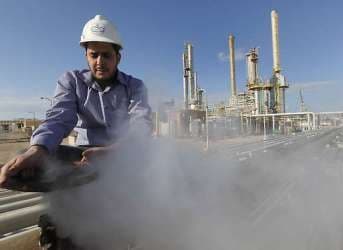OPEC in its monthly report for March notes a steady increase in Libyan oil production since the conflict began last year. Production for February, the cartel reports, was about 75 percent of the pre-war levels. This week, the country's prime minister received accolades from Washington as Tripoli marched closer to June elections for a constitutional assembly. OPEC, however, warned that unrest could resume if the interim administration in Tripoli fails to generate broad-based national support. If lingering political issues in Iraq provide any insight, it's important that Tripoli ensures investors that a federalism campaign won't impact recovery in the country's oil sector.
OPEC said a lingering economic crisis in the European Union would constrain exports of North African crude oil. Growth in major oil-producing countries like Libya, however, is expected to offset the long shadow cast by the dismal European economy. Libyan oil production, the oil cartel said, was estimated at 1.18 million barrels per day for February, about 75 percent of the levels before the war.
Libyan oil production during the third quarter of 2011 nearly ground to a halt as the regime of Moammar Gadhafi began to collapse. The shut-in threatened to derail any hopes of recovery in the global economy, prompting the International Energy Agency to call on its members to release oil from their strategic reserves to allay market concerns. OPEC said that by 2012, however, a "relatively strong" economic recovery was predicted for Libya. And with that comes more oil production.
U.S. Secretary of State Hillary Clinton, during meetings with the Libyan prime minister this week, said the rebound in Libya's oil sector has "exceeded everyone's expectations." OPEC figures confirm that sentiment, yet the March report also warns that Libyan political recovery is exceptionally fragile.
Libya plans to hold elections for a constitutional assembly in June. National reconciliation, however, is hampered by growing frustration with the pace of reforms enacted by the National Transitional Council, the interim administration in Tripoli. This week, political leaders and tribal elders pushed for semi-autonomy in the oil-reach eastern region known historically as Cyrenaica. Interim authorities, in response, warned the campaign could threaten the unity of post-war Libya. While a semi-autonomous Cyrenaica would cede authority to Tripoli on energy issues, the move could ultimately interfere with recovery in the country's oil sector.
It's been roughly nine years to-the-day since U.S. forces intervened in Iraq and the political landscape in the country remains tense. The country still lacks legislation that would govern the national energy sector and disputes between the semiautonomous Kurdish government and the central government in Baghdad continue to weigh on the minds of international oil companies. If a campaign for federalism in Iraq's south evolved, Iraq's oil outlook could look bleak. Libya could face a similar future if the federalism campaign evolves.
Political overseers in Libya should ensure that energy matters are in order no matter what political system develops after the war. Oil companies like Italy's Eni had no qualms about dealing with interim leaders in Libya during the war, but that was when the country was united in opposition to Gadhafi. While a sea change in post-war Libyan politics is to be expected, its leaders should maintain at least some aspect of the status quo in terms of the oil sector. OPEC in its March report notes Libyan oil production is increasing, but it warns that if interim leaders are unable to restore social stability, "widespread unrest may begin again."
By. Daniel J. Graeber of Oilprice.com


















